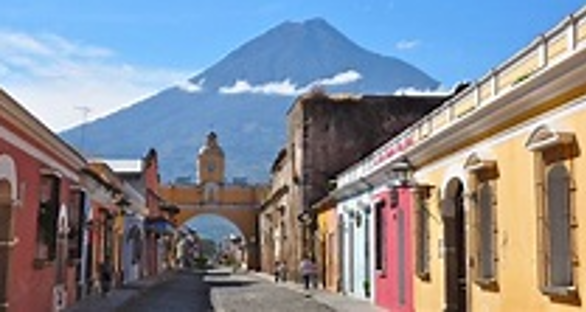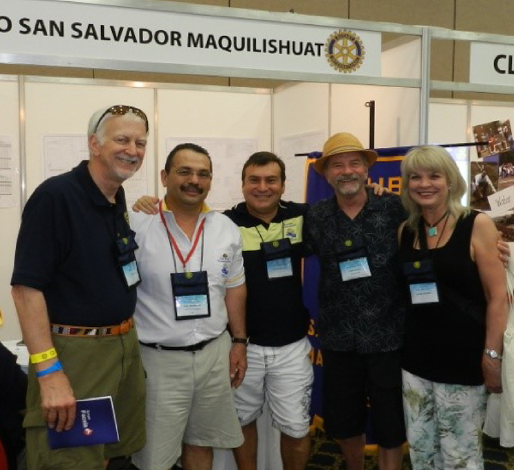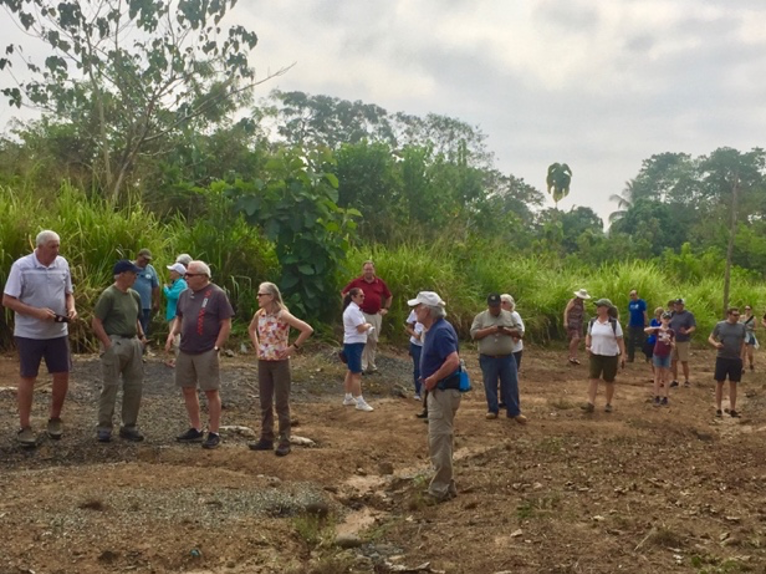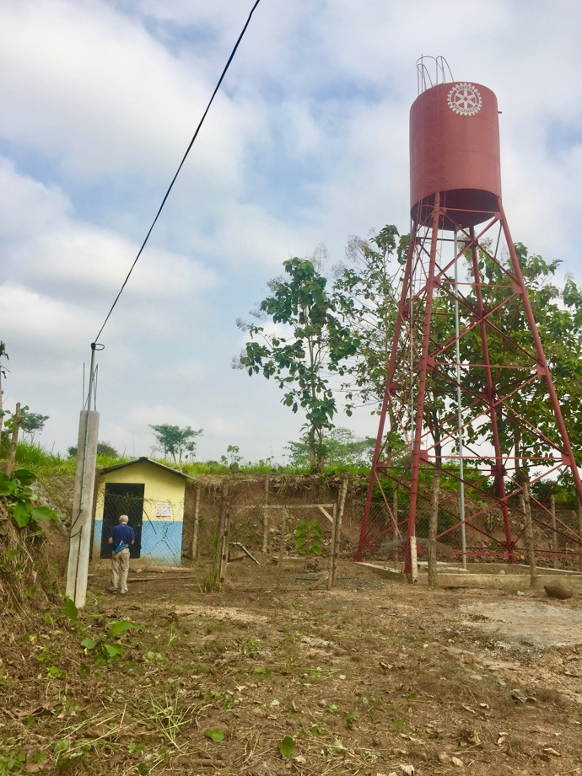Project Fairs
International Travel + International Fellowship = International Collaboration = International Service
By: Jon Gresley, Rotary Club of Truckee
Rotary’s Vision Statement: Together, we see a world where people unite and take action to create lasting change — across the globe, in our communities, and in ourselves.
Since 2000, I have attended twenty project fairs, sixteen in Central American and four in Colombia. Attendance at project fairs provides Rotarians with opportunities for international travel, fun and engagement with fellow Rotarians in service. I am providing this article for Rotarians to learn about participation in project fairs to fulfill Rotary’s Vision in their personal lives.
Project Fair history
The first project fair was a gathering of Rotarians invited from throughout the seven Central American countries (two Rotary districts) to exhibit to, and seek support for their service projects from Rotarians from the United States and Canada. The group gathered near Retalhuleu, in western Guatemala in 1993. The two individuals recognized as the founders of the fair, known as Uniendo America (“Uniting America”) were Karl Stucki (Oakland) and Juan Forster (Guatemala City). Each year since, a fair has been held the last weekend of January in Central America. The most recent (28th Uniendo America) was held in Antigua, Guatemala, a UNESCO World Heritage site. Unfortunately, both Karl and Juan have passed away, but they have left a legacy that now reaches around the world.

Antigua, Guatemala
Rotarians around the globe have replicated the fair
More than a dozen years ago, project fairs were first held in West Africa and in Ecuador. Now, project fairs are being held each year in Central America, West Africa, Ecuador, East Africa, and Colombia. There have also been project fairs in Europe, Brazil, Egypt, and Mexico. While there are variations between fairs, they all provide opportunities for Rotarians from around the world to meet in fellowship, learn about other cultures (including food, beverage, and cultural entertainment), and form partnerships to support projects in the host country(s). They typically run for 2-1/2 to 3-1/2 days. Often there are opportunities for local visits to see existing or potential service projects or to combine travel to a fair with other cultural travel to see near-by points of interest such as archeological sites, national parks and other areas of natural wonder.
Building lasting relationships
My first project fair was in Tegucigalpa, Honduras in 2000. My wife, Rotarian Gudrun Dybdal, and I were among a small group from the Rotary Club of Oakland. On that trip we not only met Rotarians from various parts of Central America, we also found ourselves among a group of Rotarians from our home District, 5170. The friendships we made with Rotarians from our home district have lasted for more than twenty years.
We have formed strong bonds with Rotarians from throughout Central America and Colombia. We have made trips to visit active projects, partnerships between the Oakland Rotary and the local host club, staying in the homes of our friends in Central America on many occasions. Over these same years, we have also formed strong friendships and partnerships with Rotarians from parts of Canada and many regions of the United States.
Partnering on service projects
Before there were Global Grants, we were partnering on Matching Grants nearly every year as a result of our participation in Uniendo America. When District 5170 became a part of the pilot for Global Grants, Gudrun took on the fund-raising for Oakland’s first Global Grant, construction of a block of toilets for an elementary school in a remote community in Belize. I visited the school along with a group of fellow Oakland Rotarians while attending a project fair in Belize City.

Rotarians from Oakland and San Salvador at Uniendo America
A collaboration formed at project fairs
A more recent experience provides a perspective of the opportunity for collaboration on a very broad scale. In January 2019, I attended Uniendo America in San Jose, Costa Rica. Attending the fair were Dr. Gustavo Morales of the Rotary Club of Mazatenango, Guatemala and Mark Rohweder of the Rotary Club of Kalispell, Montana. Their booth promoted a project of the Mazatenango Club to build a water system for the community of La Vega, a few hours drive from Mazatenango. La Vega is a village of about 300 families re-located to this sugar growing area during the war of the 1980s and 1990s. They were assured of having local services including adequate water. Unfortunately, the water system has not been adequate. After seeing a smaller but similar water system built nearby through a Rotary global grant, advocates for the community reached out to the Mazatenango Rotary Club to seek their assistance. The partnership between the Mazatenango Club and a consortium of Montana Rotary Clubs was activated to swing into action. Gustavo and Mark were in San Jose to begin the long process of raising over $300,000 through a global grant. They were going to need a lot of help from what has evolved into a broad collaboration of Rotary clubs from the United States and Canada. Oakland Rotary has had a long-standing relationship partnering on a number of Matching Grants with the Mazatenango Rotary, and I had previously visited the Mazatenango Rotary Club a number of times. I offered my support and eventually was successful in obtaining a commitment for $6000 in cash and $6000 in District Designated Funds (DDF) to support the project from the club. With the Rotary International Foundation match that these funds earn, the value of this contribution represented $21,000 to the overall budget.
A funding gap to be filled
By January of 2020 and the project fair in Antigua, the team had begun to close-in on the total needed budget of $315,000. Mark was once again at the fair as were representatives of Mazatenango in a booth to promote the clean water project. As I began to make the rounds seeking more support, I quickly learned that many Rotary clubs with whom we had previously partnered on other global grants were already signed onto this project. All of us continued networking with the goal of raising the remainder of the required funds.
Touring the local community in need of clean water
The Montana Rotarians had planned a trip following the fair to tour the completed water project in Progresso, the La Vega site and another project that was about to launch. It was to be a four-day tour. Gudrun and I had signed on, so left Antigua with the group; and over the next few days, traveled around western Guatemala with over 20 Rotarians from Montana and Oregon. After visiting El Progresso and La Vega in person and helping to celebrate the 40th Anniversary of the Mazatenango Rotary Club, we were more committed and driven to help fill the funding gap.

Rotarians from Montana on a tour of a completed water project in Guatemala
We returned to California after the project fair and tour in Guatemala and another fair in Cali, Colombia, the following weekend. As we travelled home, the COVID19 pandemic was just beginning to hit the western hemisphere.
Finding the last collaborators – filling the funding gap:
By March of this year the gap in funding had shrunk to $11,000, an amount that could be bridged with $5500 in DDF (matched with $5500 from RI). At this point, I learned that there were clubs in District 5170 that were looking for international service projects worthy of
support. As there were a couple of Rotarians in these clubs that had attended Uniendo America project fairs over the years, I reached out to them and sought their support. One was Joe Hamilton, Past District Governor, a member of the Cupertino Rotary Club. Joe and I met in 2000 in Tegucigalpa, Honduras at the project fair. Another was Peter Andersen from one of the Rotary Clubs in Area 6 of District 5170. Both found support from other members of their clubs. By the end of April, the gap was filled with the Rotary Club of Cupertino and the Area 6 Rotary Clubs each committing $2750 DDF.
It takes a village:
It is not likely that any pair of clubs, or even small group of Rotary clubs would be able to raise the funds needed to accomplish such a large project. As I survey the list of clubs and Districts contributing to this global grant, I find many familiar names, Rotarians from Rotary Clubs in Montreal and other parts of Canada; Portland, Oregon; Louisville, Kentucky, Iowa, and of course several in Montana and California. A number of these Rotarians and Rotary clubs have partnered with Oakland Rotary Club on numerous global grants in Central America and Colombia in recent years. All these familiar names are Rotarians I have come to know from my participation in project fairs in Central America and Colombia. Had so many of us not participated over the years, we wouldn’t have had the relationships and connections to help build the pool of funding to make this project possible.

Completed water project by Rotary Club of
Mazatenango and Montana Rotary in El Progresso, Guatemala
There may not be any better example of how project fairs have provided the opportunity for Rotarians and Rotary clubs to form friendships, collaborations and partnerships to support international projects. The La Vega community in a remote part of Guatemala will one day, hopefully not too distant, have a water system that meets their needs. When they do, it will be as a result of the opportunity to network, build friendships and partnerships among Rotarians founded more than twenty-five years ago by two Rotarians who saw the potential in organizing the first project fair. With more than half a dozen project fairs now taking place annually, Juan and Karl’s vision has left an incredible legacy of international partnership and service.
I urge all Rotarians of District 5190 to consider attending a project fair in a part of the world where you have an interest and where you would like to make a difference. Attendance at project fairs will give you the opportunity to take action to create lasting change — across the globe, in your communities, and in yourselves.
Fairs are planned for Panama City (Uniendo America) the last weekend of January 2021, and Medellin, Colombia the first weekend of February 2021. Other project fairs have been planned for Brazil and both West and East Africa. It is not clear how the COVID19 pandemic will affect these schedules. Will they occur, will they be virtual project fairs, or will they be postponed? Stay tuned.
Rotary International posts information on project fairs at:
If you are interested in finding out more about project fairs or supporting a global grant, please feel free to write me at jongresley@hotmail.com